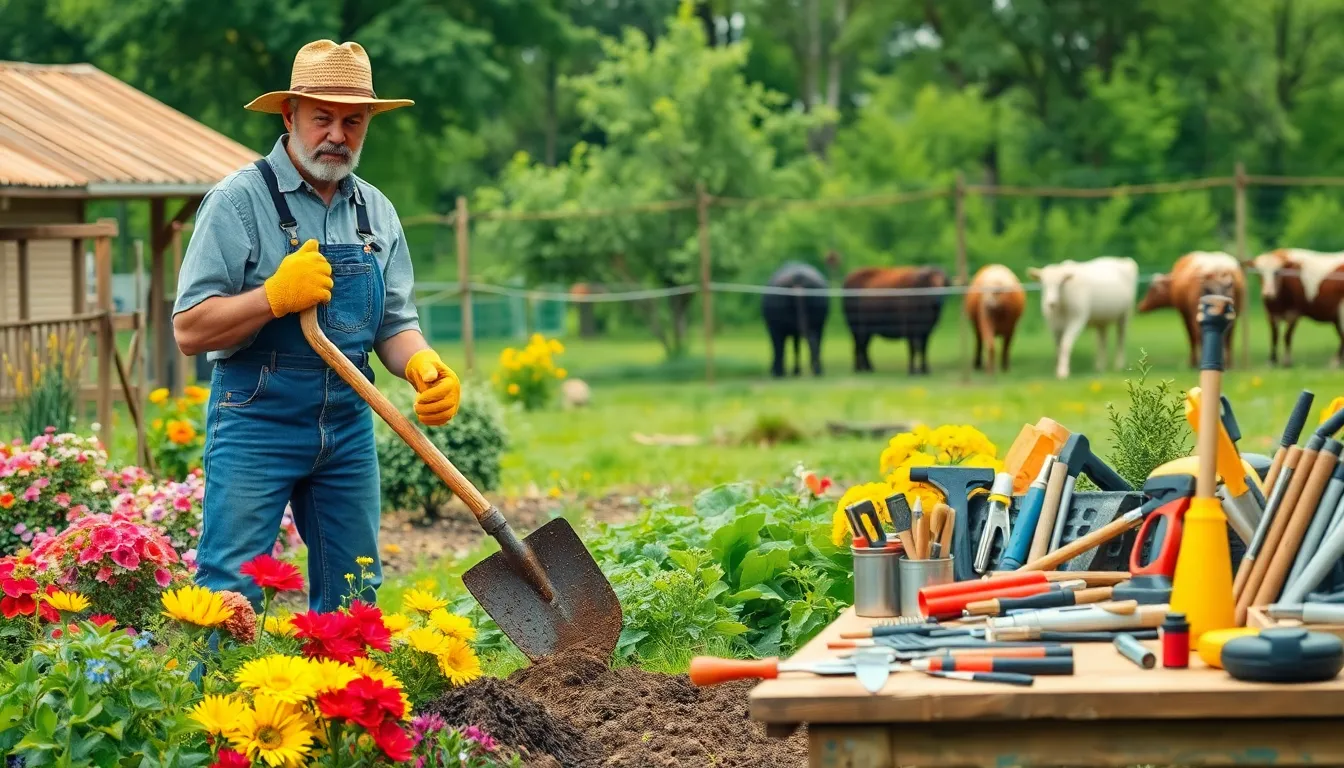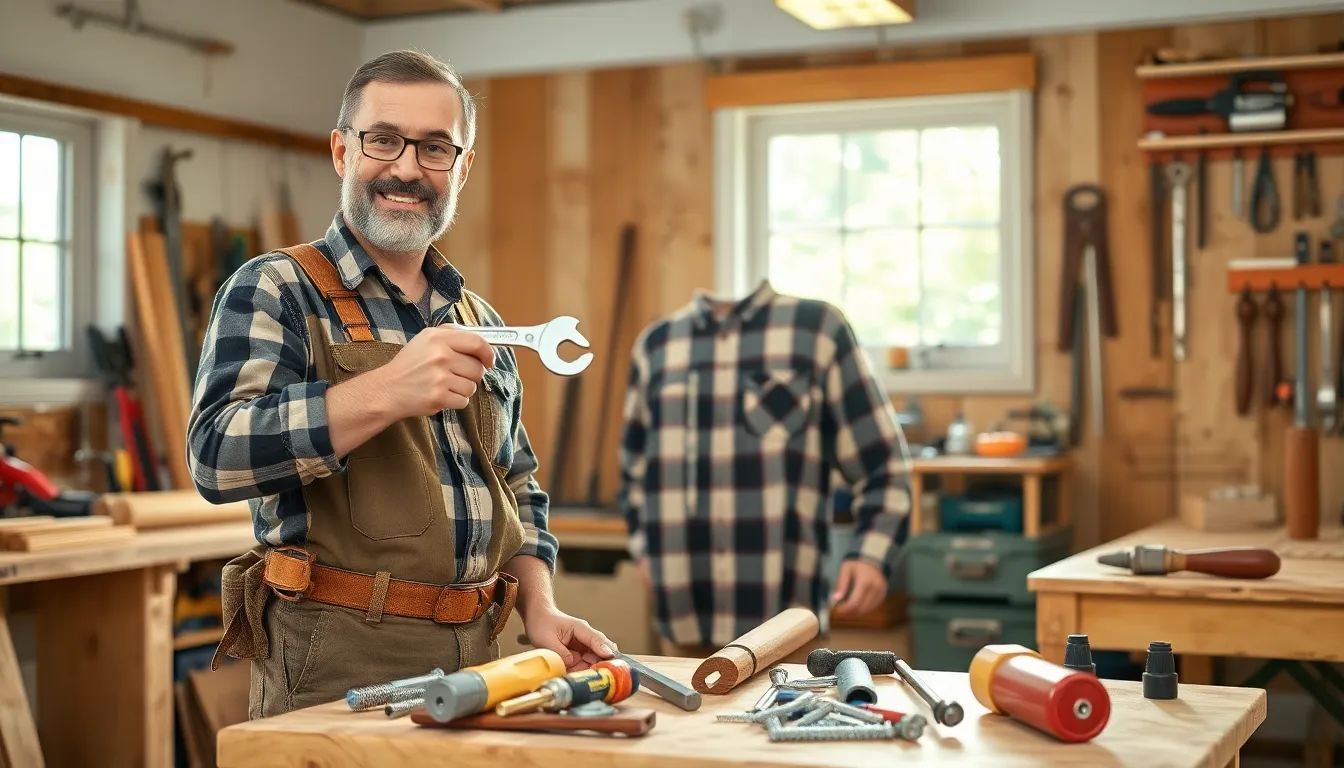In the world of DIY projects and home improvements, farm and home hardware is the unsung hero. It’s the trusty sidekick that helps transform wild ideas into reality, whether it’s fixing a leaky faucet or building the ultimate chicken coop. Who knew that a simple wrench could hold the power to save the day?
Table of Contents
ToggleOverview of Farm and Home Hardware
Farm and home hardware encompasses a wide range of tools and equipment essential for various projects. These tools serve both agricultural needs and household improvements. Contractors, artisans, and homeowners alike depend on high-quality hardware to achieve their goals.
Essential items include hand tools, power tools, building materials, and garden supplies. Hand tools, like hammers and screwdrivers, are crucial for smaller repairs and intricate tasks. Power tools, such as drills and saws, make larger projects more efficient and effective.
Building materials significantly impact the durability of structures. Common materials include timber, plywood, and metal sheeting, all of which cater to different construction needs. Garden supplies, like seeds, fertilizers, and irrigation systems, support effective vegetable and flower cultivation.
Innovations in home hardware technology enhance the functionality and precision of tools. Battery-powered equipment offers portability and eliminates the need for extension cords. Ergonomically designed tools reduce strain during extended use, promoting safety and comfort.
In the realm of farm hardware, tractors and implements are vital for cultivation and maintenance. Advanced machinery increases productivity and reduces labor costs, allowing farmers to manage larger operations with fewer resources. Regular maintenance of this equipment ensures longevity and optimal performance.
Choosing the right hardware requires assessing individual project requirements. Compatibility between tools and materials directly influences the outcome of DIY endeavors. Investing in reliable, durable tools ultimately leads to more successful projects and satisfied users.
Types of Farm and Home Hardware


Farm and home hardware includes a variety of tools and equipment designed for gardening, livestock care, and home improvement projects.
Tools for Gardening
Gardening tools play a critical role in maintaining healthy landscapes. Essential items include shovels, rakes, hoes, and trowels for effective soil management. Pruners and shears assist in shaping plants and encouraging growth. Watering equipment such as hoses and sprinklers ensures adequate moisture levels. Garden gloves provide safety and comfort during prolonged use. Fertilizers, soil amendments, and pest control products enhance garden health. Integrated systems like drip irrigation offer efficient moisture distribution to plants. These tools, when chosen wisely, contribute significantly to garden productivity.
Equipment for Livestock
Equipment for livestock management ensures optimal health and productivity. Feeders and waterers deliver essential nutrients and hydration consistently. Fencing materials, such as barbed wire or electric fencing, protect animals from predators and prevent escapes. Housing structures, including barns and shelters, provide safe spaces for animals. Grooming tools, such as brushes and clippers, maintain the welfare of livestock. Health care supplies, including vaccines and medications, keep animals disease-free. Regular maintenance of this equipment promotes a healthier livestock environment, improving overall farm efficiency.
Home Improvement Supplies
Home improvement supplies encompass a wide range of materials needed for renovation and repair projects. Lumber and plywood serve as the foundation for new structures and repairs. Fasteners such as nails, screws, and anchors play essential roles in holding everything together. Paint and finishing products enhance aesthetics and protect surfaces from wear. Insulation materials contribute to energy efficiency in homes. Electrical supplies, including wiring and fixtures, enable modern conveniences. Adequate plumbing fixtures, such as faucets and pipes, ensure effective water flow and sanitation. Utilizing quality supplies guarantees successful improvement and renovation outcomes.
Choosing the Right Hardware
Selecting suitable hardware requires careful consideration of both needs and budget. Understanding specific requirements simplifies the selection process.
Understanding Your Needs
Recognizing the scope of projects guides hardware choices. Identify tasks, whether small repairs or major renovations, and determine essential tools for each. Different projects may demand various equipment, like hand tools for intricate work and power tools for efficiency. Consider the level of expertise involved, as some tools are more user-friendly than others. Healthy landscapes require specialized gardening tools, while livestock management necessitates sturdy fencing materials. Assessing personal and project needs aids in making informed decisions.
Budget Considerations
Establishing a budget plays a critical role in hardware selection. Determine a reasonable amount based on project scope and hardware requirements. Invest in quality tools, as they often offer better durability and performance. Price variations exist across brands and types of tools, so researching options can reveal affordable yet reliable choices. Set priorities for essential items versus optional extras to maximize the budget’s impact. Allocating funds wisely leads to optimal project outcomes without overspending.
Maintenance of Farm and Home Hardware
Maintenance plays a vital role in the longevity and functionality of farm and home hardware. Regular care ensures tools and equipment perform at their best, enhancing productivity in various DIY projects.
Regular Care Tips
Inspect tools regularly for wear and tear. Cleaning equipment after each use prevents rust and prolongs lifespan. Lubricating moving parts keeps tools functioning smoothly, while tightening loose screws and connections ensures stability. Storing items in dry, accessible spaces prevents damage from moisture. Sharpening blades on gardening tools maintains cutting efficiency, and routinely checking batteries in power tools guarantees they operate reliably. Scheduling professional maintenance for larger equipment, like tractors, helps identify potential issues early.
When to Replace Equipment
Recognizing when to replace tools and equipment is crucial for maintaining productivity. Signs of wear, like visible rust or cracks, often indicate that replacement might be necessary. If a tool requires frequent repairs, it may cost more than new equipment. Additionally, outdated technology can hamper efficiency; investing in modern, energy-efficient tools often improves performance. Consider replacing garden hardware after several seasons of heavy use, especially if it no longer performs effectively. Evaluating the cost and benefits of new equipment helps ensure a wise investment.
Farm and home hardware serves as the backbone of successful DIY projects and home improvements. By investing in the right tools and materials, individuals can enhance their creativity and efficiency. Quality hardware not only ensures durability but also simplifies tasks, whether it’s tending to a garden or completing a renovation.
Regular maintenance of tools and equipment is key to maximizing productivity and longevity. Understanding the specific needs of each project allows for smarter choices, ultimately leading to satisfying results. With the right approach to selection and care, anyone can turn their ideas into reality, making farm and home hardware an invaluable asset in any household.

